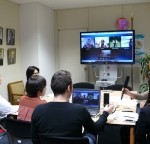2013.03.22
[Session 2] International Women’s Day
Women's Education – Voices from African female students studying at Japanese universities
Africa's economic development and growth is moving forward. This is why the international community has been paying more attention to Africa. The 5th Tokyo International Conference on African Development (TICAD V) will be held in Yokohama City, Japan, in June. It is expected that Japanese public’s interest in Africa will grow further.
The role of women in Africa
In session 2, UNIC Tokyo’s interns interviewed four African female students studying at Japanese universities which belong to the UN Academic Impact (UNAI). “How has Africa’s growth influenced women?” Please see how the students answered to our questions.
【Students’ Profile】
●Mkakoma Rahel Nasoni, The United Republic of Tanzania
1st year, Master of Graduate School of Governance, Meiji University
●Lartey Stella Twumwaa, The Republic of Ghana
2nd year, Master of Graduate School of International Relations, International University of Japan
●Makatiani Jacueline, The Republic of Kenya
3rd year, Doctor of Graduate School of Bio-resource and Bio-envirionmental Science, Kyushu University
●Kabwadza Ponyadira, The Republic of Malawi
1st year, Doctor of Graduate School of Biology and environmental Science, Ehime University
* * * * *
The impression of Japanese women
“Some of you have lived in Japan for a long time. You have observed the Japanese society, particularly the roles of women. What have you noticed and what kind of impression do you have?”
Mkoma Rahel Nasonl: I was surprised about their attitude to others. This is different from my country where people throw trash away everywhere. When I go back to my country, I want to tell them about things we have learnt from Japan. However, it seems that the Japanese women are generally modest. For example, when I attended a symposium, all the speakers were men. I didn’t see women on the stage. Only men can take the rostrum? Why not women? Moreover, every time I ask my colleagues if they are married or have children, they say “No”. When I ask the reason, they say, “In Japan, many working women quit their job when they have a baby. Even if they take maternity leave and return to the office, it is not easy to make a complete comeback.” If this is true, we cannot say that the environment surrounding the Japanese women is desirable.
Kabwaza Ponyadira: I agree with Rahel. In Japan, every woman goes to school and she is educated. When it comes to work, however, they tend to face difficulties. When I was in Malawi, I had a balanced-life between work and family. I think Japan needs to develop an environment to support working women.
Lartey Stella Twumwaa: I was surprised to know that many women quit their job when they have children. In Africa, it is normal to have some children but generally they keep working. Japan is expected to create a system so that women can continue their career.
More women’s empowerment is necessary
“Today, there are two female presidents in Africa. In 2011, two women from Republic of Liberia received the Nobel Peace Prize. Do you think women’s empowerment in Africa has been growing? Do you feel any changes on women’s environment?”
Mkoma: Although we have to take care of our family while working, women’s situation is changing as we see more women in the professional field. Before the political reform, women couldn’t acquire a high-ranking position at work and we had few female politicians. The fact that we now have female presidents reflects the current situation.
Makatiani Jacqueline: I can say that women’s empowerment has been expanding in Africa, for example in education. In the past, women stayed at home all day and their task was only housework. Now, it is not true. Girls go to school and they have opportunities to be educated.
Kabwaza: More women have chances to participate in business. And women do the jobs which men have previously done.The role of women is definitely changing and its importance has intensified. It can be said that the same thing in Malawi as well. I am sure that this trend will continue in the years to come.
Fields of Partnership between Japan and Africa
“Japan has supported Africa's development in various ways. In the future, how can Japan and Africa cooperate and in which field? What kind of assistance do you expect from Japan?”
Kabwaza: Africa still faces financial hardship due to corruption and insufficient democratization. However, I believe that Africa has enormous potentialities for the future. I expect Japan’s support for youth’s education. They will create Africa’s tomorrow. Supporting them would benefit Japan in the future.
Lartey: Education is important for women’s empowerment and also for solving problems we have at the present. It is because those problems are caused by the lack of access to education on the side of women.
Dreams and visions
“What is your vision for the future? What kind of role do you want to play when you go back to your own country?”
Mkoma: Since I was working as a teacher at university in my country, I want to continue teaching and be a good facilitator for the students. Teachers contribute to a country’s development throughout education. That is why I think it is important to support young people who will play an important role in the future. I also have a keen interest in global warming. I want to address environment issues as a consultant and as a woman.
Makatiani: I want to work at the university. This is because I want to continue my research and lead my country to peace. In Kenya, there are not so many women studying science. I hope I can be a model for those women who have interest but are hesitant to challenge this field.
The importance of education
Four female students enthusiastically discussed the improvement of women’s role in Africa and visions they have. At the end of the interview, UNIC Tokyo’s interns asked them to send messages to women in the world. All of them stressed the importance of education as below.
Makatiani: It may not be easy and you may take time to achieve your goals even you study very hard. But keep challenging. In order to solve problems we are facing, we need to keep going forward.
Lartey: Education is the best way to improve women’s empowerment and further development of our country. We should not miss the chance to make the world better. Education would benefit you and, as a result, benefit the world.
* * * * *
最近の記事
-
2026.02.12
「1.5℃の約束 – いますぐ動こう、気温上昇を止めるために。」国連とメディアによる気候キャンペーン、2026年も継続して実施 -
2026.02.10
科学における女性と女児の国際デー(2月11日)に寄せるアントニオ・グテーレス国連事務総長メッセージ -
2026.02.09
2026年の優先課題に関する総会でのアントニオ・グテーレス国連事務総長の発言(ニューヨーク、2026年1月15日) -
2026.02.05
日本の国連加盟70周年ロゴマークを募集します! -
2026.02.05
UNICブログ:2025年ヤング・アクティビィスト・サミット授賞式レポート 川﨑レナさん 「ハッシュタグからアクションへ」

























